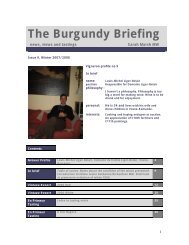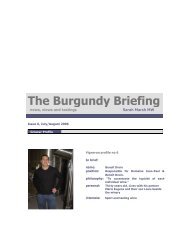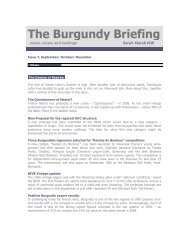En primeur tasting - Burgundy Briefing
En primeur tasting - Burgundy Briefing
En primeur tasting - Burgundy Briefing
Create successful ePaper yourself
Turn your PDF publications into a flip-book with our unique Google optimized e-Paper software.
Ripe seductive and spicy with a suggestion of nutmeg on the palate. Very compact in<br />
the middle palate with a strong architectural framework, fleshed out with opulent<br />
fruit. Powerful and full-bodied wine with plenty of style. Score 18. From 2009<br />
Pommard, Epenots, 2002<br />
Delicious nose, very classic. Elegant palate firmly structured with lovely intensity,<br />
fine structural tannins, good grip with rather lifted fruit, slightly exotic. It’s<br />
harmonious, complex and stylish with an impressive finish. Score 19. From 2008<br />
Pommard, Rugiens<br />
Very energetic wine. Lifted and a bit exotic. A sophisticated palate, very long, direct<br />
and fluid with elegant flowing tannins. Firm black fruit and sleekly textured. Fine to<br />
very fine. From 2010/12<br />
Stockists<br />
UK: Lea and Sandeman; O.W. Loeb & Co. Ltd.<br />
USA: Diageo Château & Estate.<br />
Domaine Du Marquis D’Angerville, Volnay<br />
Very late malos here and high levels of malic acidity. The Volnay was still going<br />
through when I arrived in November. Renaud de Vilette is not sure why. There was<br />
snow in March so the temperatures were not warm enough, then it started in later<br />
spring and stopped and even the warmth of June would not kick start it.<br />
Like many, de Vilette considers a later malolactic to be beneficial. It is good if it starts<br />
in April. In 2003 it came immediately as the cellars were still warm in September and<br />
the harvest was so early. This year at Domaine d’Angerville they will bottle in<br />
March/April later than normal (January/February), so the wine has time on the lees<br />
after the malo has finished. “This is important for the long evolution of the wine.”<br />
Normally the alcoholic fermentation is very short at this estate, “for finesse,”<br />
comments de Vilette. There is a prefermentation of around 4 days as the indigenous<br />
yeast kicks into action, and then 6-7 days of fermentation, never more. No long<br />
macerations here. The other notable practice is the use of remontage, rather than<br />
pigeage. This is traditional at this estate, not something new.<br />
Only 15-20% new barrels. “We don’t want to hide the finesse of the wine.”<br />
Meanwhile work in the vineyard has included a project of massale sélection. A<br />
selection of 40-50 vines from 35-40 years old vines in Taillepieds was propagated.<br />
Next year some of the vines in year Champans will be replanted.<br />
Renaud de Vilette considers it to be a good year, but not one requiring a long time to<br />
come around. However a good vintage for de Vilette is not a vin de garde “Sometimes<br />
these wines are never good, never subtle, the tannins never soften - like 1998 which<br />
has big tannins and I don’t see any evolution.” He favours “freshness and lovely<br />
fruit,” as in 1992.









